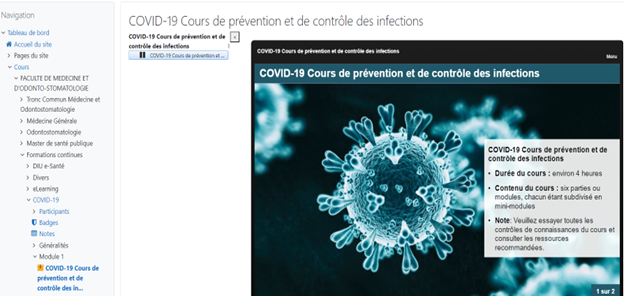Building the IPC Capacities of Health Workers in Mali through E-Learning
Pour lire cet article en français, veuillez cliquer ici.
After more than two years of suffering from the consequences of the COVID-19 pandemic that claimed the lives of millions of people and weakened economies worldwide, awareness is now widespread on the importance of preventing and controlling infections.
However, not all health workers have the same access to build their capacities and to protect patients and their colleagues in health facilities, a situation that many face in Mali. According to an assessment performed using the World Health Organization (WHO)’s infection prevention and control (IPC) Assessment Framework (IPCAF) in 16 health facilities in September 2021, only 3 were considered as advanced. Therefore, it is necessary to find innovative approaches to increase access so all health agents have the required skills.
Implementing IPC E-Learning Training in Mali
In light of this challenge, the US Agency for International Development (USAID) tasked its Medicines, Technologies, and Pharmaceutical Services (MTaPS) Program to support the Government of Mali for the implementation of an e-learning platform to host an IPC course.
USAID MTaPS collaborated with three organizations to host Moodle platforms on which the IPC course would be offered—the General Directorate for Health and Public Hygiene (DGHSP), the National Institute for Health Sciences (INFSS), and the Faculty of Medicine and Ondostomatology/Faculty of Pharmacy (FMOS).
With MTaPS’ technical support, the three organizations implemented the platforms that focus on current national guidelines on health care-associated infection prevention and on best international clinical practices for preventing and managing infections caused by multiresistant bacteria.
Additionally, MTaPS built the capacities of assigned platform managers in order to administer the IPC course for continuous training of health professionals and students. 40 people were trained at the central and regional level. A meeting with the Dean of the University of Medicine of Bamako and his team to present the course also enabled the university to provide the course to students.

Screenshot of the FMOS/Faculty of Pharmacy e-learning platform.
Launching the platform in Mali
The e-learning platform was officially launched by the Minister of Health and Social Development during a meeting that included 91 people representing MTaPS, the USAID Mission, the National Institute for Public Health, the DGSHP, the FMOS, the INFSS, the Ministry of Health and Social Development, WHO, and UNICEF.
“With diseases including COVID-19 and Ebola, we need to ensure that our system is resilient so we can continue to offer quality care for all. Health workers are on the frontline and if we don’t take precautions, we [health professionals] can be infected and impacted. To be able to have better knowledge, we can now use this e-learning platform […] which is an efficient and trustworthy tool,” said the Health Minister.
A year after the launch of the platform, registration has increased significantly from 40 in October 2021 to 121 in June 2022, including 64 people for IPC course and 57 for the course on COVID-19. Additionally, 16 people received their certificate of completion (11 in IPC and 5 for COVID-19).
“Quality of care is closely linked with the enforcement of standard IPC measures. Unfortunately, in spite of its importance, this topic isn’t taught or taught marginally in the university curriculum. By providing open access IPC modules, this platform will help strengthen the knowledge of health professionals on IPC and help improve their own health and the quality of care in their health facilities,” shared Moussa Ag Hamme, Lead for the DGHSP’s Sub-Directorate for Public Hygiene and Cleanliness, on the launch of these platforms.
These e-learning platforms will contribute to a strategic objective of Mali’s AMR National Action Plan (2019-2023) of strengthening hospital hygiene measures for human and animal health.

A person using FMOS e-learning platform. Photo credit: Ousmane Traoré, MTaPS